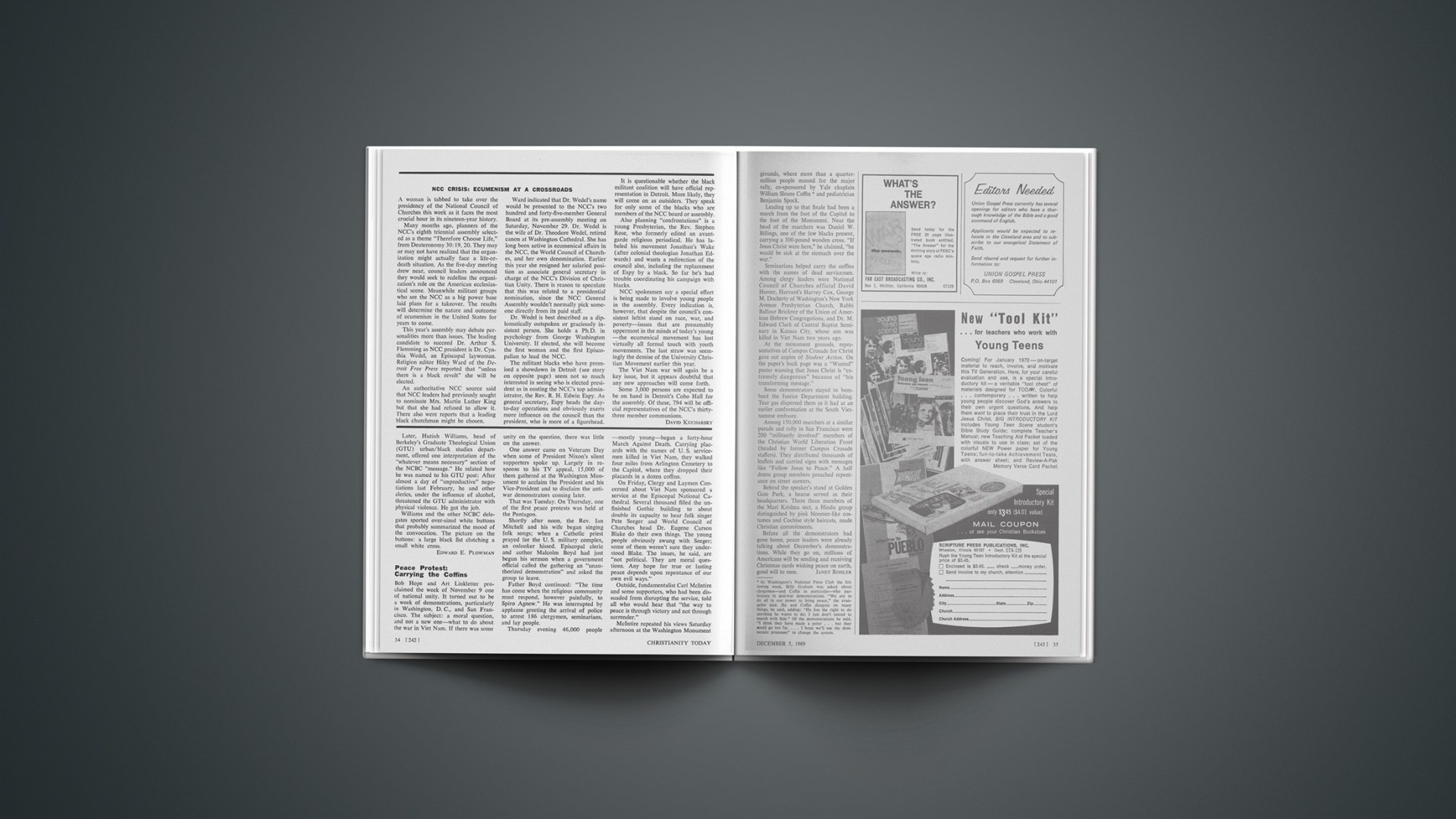A woman is tabbed to take over the presidency of the National Council of Churches this week as it faces the most crucial hour in its nineteen-year history.
Many months ago, planners of the NCC’s eighth triennial assembly selected as a theme “Therefore Choose Life,” from Deuteronomy 30:19, 20. They may or may not have realized that the organization might actually face a life-or-death situation. As the five-day meeting drew near, council leaders announced they would seek to redefine the organization’s role on the American ecclesiastical scene. Meanwhile militant groups who see the NCC as a big power base laid plans for a takeover. The results will determine the nature and outcome of ecumenism in the United States for years to come.
This year’s assembly may debate personalities more than issues. The leading candidate to succeed Dr. Arthur S. Flemming as NCC president is Dr. Cynthia Wedel, an Episcopal laywoman. Religion editor Hiley Ward of the Detroit Free Press reported that “unless there is a black revolt” she will be elected.
An authoritative NCC source said that NCC leaders had previously sought to nominate Mrs. Martin Luther King but that she had refused to allow it. There also were reports that a leading black churchman might be chosen.
Ward indicated that Dr. Wedel’s name would be presented to the NCC’s two hundred and forty-five-member General Board at its pre-assembly meeting on Saturday, November 29. Dr. Wedel is the wife of Dr. Theodore Wedel, retired canon at Washington Cathedral. She has long been active in ecumenical affairs in the NCC, the World Council of Churches, and her own denomination. Earlier this year she resigned her salaried position as associate general secretary in charge of the NCC’s Division of Christian Unity. There is reason to speculate that this was related to a presidential nomination, since the NCC General Assembly wouldn’t normally pick someone directly from its paid staff.
Dr. Wedel is best described as a diplomatically outspoken or graciously insistent person. She holds a Ph.D. in psychology from George Washington University, If elected, she will become the first woman and the first Episcopalian to lead the NCC.
The militant blacks who have promised a showdown in Detroit (see story on opposite page) seem not so much interested in seeing who is elected president as in ousting the NCC’s top administrator, the Rev. R. H. Edwin Espy. As general secretary, Espy heads the day-to-day operations and obviously exerts more influence on the council than the president, who is more of a figurehead.
It is questionable whether the black militant coalition will have official representation in Detroit. More likely, they will come on as outsiders. They speak for only some of the blacks who are members of the NCC board or assembly.
Also planning “confrontations” is a young Presbyterian, the Rev. Stephen Rose, who formerly edited an avantgarde religious periodical. He has labeled his movement Jonathan’s Wake (after colonial theologian Jonathan Edwards) and wants a redirection of the council also, including the replacement of Espy by a black. So far he’s had trouble coordinating his campaign with blacks.
NCC spokesmen say a special effort is being made to involve young people in the assembly. Every indication is, however, that despite the council’s consistent leftist stand on race, war, and poverty—issues that are presumably uppermost in the minds of today’s young—the ecumenical movement has lost virtually all formal touch with youth movements. The last straw was seemingly the demise of the University Christian Movement earlier this year.
The Viet Nam war will again be a key issue, but it appears doubtful that any new approaches will come forth.
Some 3,000 persons are expected to be on hand in Detroit’s Cobo Hall for the assembly. Of these, 794 will be official representatives of the NCC’s thirty-three member communions.
DAVID KUCHARSKY









